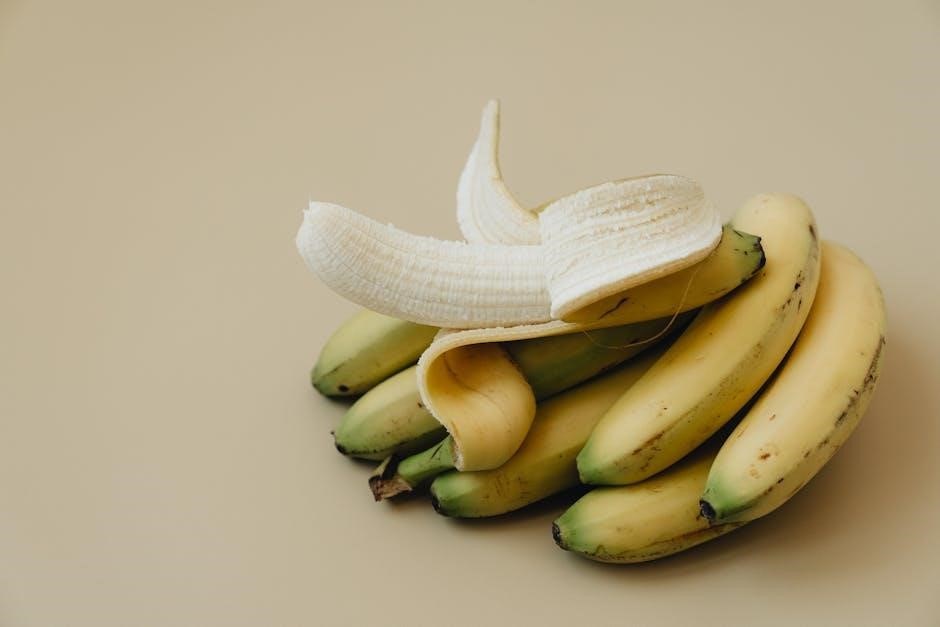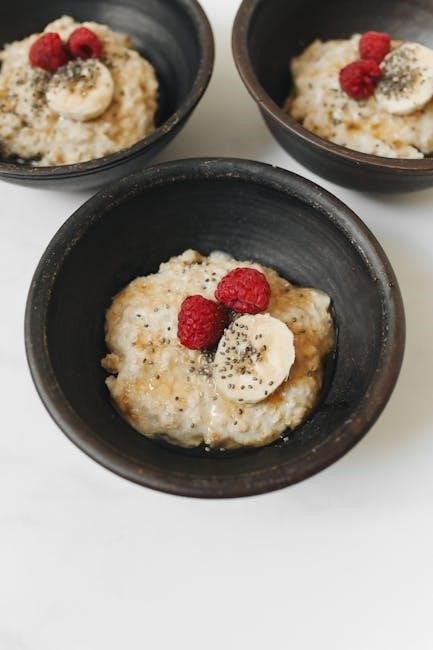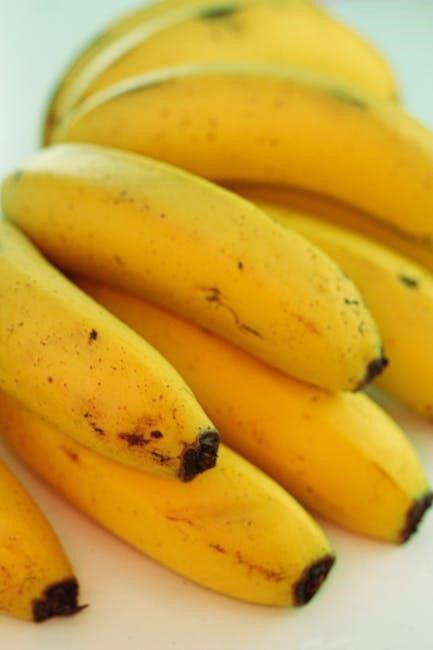Potassium-rich foods are vital for maintaining optimal health, supporting functions like nerve signaling and muscle contractions. Many people fall short of meeting daily potassium needs, making these foods essential for balancing diets and promoting overall well-being;
Overview of Potassium and Its Importance
Potassium is one of the most abundant minerals in the human body, playing a critical role in maintaining proper cellular function. It is essential for nerve signaling, muscle contractions, and regulating heart rhythm. Potassium also helps balance the effects of sodium, supporting healthy blood pressure levels. Despite its importance, many individuals fail to meet the recommended daily intake, increasing the risk of deficiency. A diet rich in potassium can help prevent conditions like hypertension and muscle weakness, while also supporting overall cardiovascular health. By focusing on potassium-rich foods, individuals can ensure they are meeting their nutritional needs and promoting long-term well-being.
Why Focus on the Top 60 Potassium-Rich Foods?
Focusing on the top 60 potassium-rich foods provides a comprehensive guide to ensuring adequate intake of this essential mineral. These foods, ranging from bananas and avocados to leafy greens and legumes, offer high potassium content while being nutrient-dense. By prioritizing these foods, individuals can easily meet daily potassium requirements, reducing the risk of deficiency and related health issues. This targeted approach simplifies meal planning and ensures a balanced diet, making it easier to maintain optimal potassium levels for overall health and well-being.

The Role of Potassium in the Human Body
Potassium is crucial for muscle function, nerve signaling, and heart health, aiding in muscle recovery, regulating fluid balance, and supporting overall bodily functions efficiently.
Key Functions of Potassium
Potassium plays a vital role in various bodily functions. It helps regulate fluid balance, supports nerve signaling, and facilitates muscle contractions. Potassium also aids in maintaining a healthy heart rhythm, promotes bone health, and assists in glucose metabolism. Additionally, it helps regulate blood pressure and supports overall cellular function. Adequate potassium intake ensures proper electrical signaling in the body, which is essential for maintaining optimal health and preventing deficiencies.
Health Benefits of Adequate Potassium Intake
Adequate potassium intake offers numerous health benefits. It helps maintain healthy blood pressure, reducing the risk of cardiovascular diseases. Potassium supports strong bones by promoting calcium retention and may reduce the risk of fractures. It also aids in muscle recovery, preventing cramps and spasms, and supports nerve function, enhancing cognitive health. Additionally, potassium helps regulate fluid balance, maintaining proper cellular function. A diet rich in potassium can contribute to overall well-being, reducing the likelihood of chronic conditions and promoting longevity;

Top 60 Potassium-Rich Foods
Potassium-rich foods include bananas, leafy greens, avocados, sweet potatoes, beans, nuts, and fatty fish. These foods provide essential nutrients, supporting overall health and bodily functions effectively.
Fruits Rich in Potassium
Fruits are a delicious and natural source of potassium, essential for maintaining healthy bodily functions. Bananas are one of the most well-known potassium-rich fruits, providing approximately 400-450 mg per medium-sized fruit. Avocados, often considered a fruit, are also high in potassium, offering around 500 mg per serving. Other potassium-rich fruits include dates, apricots, figs, and prunes. Tropical options like mangoes and papayas also contribute significantly to potassium intake. Incorporating these fruits into your diet supports muscle function, nerve health, and overall cardiovascular well-being, making them a vital part of a balanced and nutrient-rich diet.
Vegetables Rich in Potassium
Vegetables are a cornerstone of a potassium-rich diet, offering a wide variety of options to meet daily nutritional needs. Potatoes are among the highest in potassium, with a medium-sized potato providing approximately 748 mg. Leafy greens like spinach and Swiss chard are also excellent sources, delivering over 800 mg per cooked cup. Other notable vegetables include sweet potatoes, broccoli, and Brussels sprouts, each offering significant potassium content. Incorporating these vegetables into meals supports muscle function, nerve health, and blood pressure regulation, making them a crucial component of a healthy and balanced diet for overall well-being.
Protein Sources High in Potassium
Protein-rich foods are excellent sources of potassium, making them a great addition to a balanced diet. Soybeans, lentils, and black beans are among the highest, with cooked portions providing up to 1,200 mg. Chickpeas and kidney beans also offer significant amounts, around 700 mg per cup. Nuts and seeds, such as almonds and pumpkin seeds, are good options, delivering about 500 mg per ounce. For those who consume animal products, fatty fish like salmon and mackerel are rich in potassium, offering over 400 mg per serving. Incorporating these protein sources enhances muscle function, supports nerve health, and contributes to overall well-being.
Other Potassium-Rich Foods
Beyond fruits and vegetables, other foods contribute significantly to potassium intake. Yeast, such as nutritional yeast, is exceptionally rich, with over 1,200 mg per 100 grams. Coffee and chicory are also notable, offering around 1,000 mg per 100 grams. Whole grains like quinoa and farro provide about 700 mg per cup. Additionally, certain dairy products and fortified cereals can be good sources. These foods diversify potassium intake, ensuring a well-rounded diet that supports overall health and bodily functions without relying solely on produce. Incorporating these options helps meet daily potassium needs effortlessly.

Health Benefits of a Potassium-Rich Diet

Potassium-rich diets support bone health, aid in metabolism, and promote overall well-being by balancing electrolytes, enhancing muscle recovery, and maintaining strong bodily functions for optimal health.
Cardiovascular Health
A diet rich in potassium plays a crucial role in supporting cardiovascular health by helping to lower blood pressure and reduce the risk of heart disease. Potassium aids in balancing sodium levels in the body, which can help prevent hypertension, a major risk factor for cardiovascular conditions. Studies suggest that adequate potassium intake can lower the risk of strokes and other cardiovascular events by improving blood vessel function and reducing overall strain on the heart. Incorporating potassium-rich foods into your diet is a proactive step toward maintaining a healthy heart and reducing the likelihood of cardiovascular complications.

Muscle and Nerve Function
Potassium is essential for proper muscle and nerve function, as it helps regulate muscle contractions and nerve impulses. A deficiency can lead to muscle weakness, cramps, and irregular heartbeats. Potassium-rich foods support the balance of fluids within cells, enabling smooth communication between nerves and muscles. This mineral also aids in the recovery of muscle tissue after physical activity. By incorporating potassium-rich foods like bananas, avocados, and leafy greens into your diet, you can ensure optimal muscle and nerve health, reducing the risk of discomfort and dysfunction. Maintaining adequate potassium levels is crucial for overall physical performance and nervous system efficiency.
Bone Health
Potassium plays a significant role in maintaining bone health by helping regulate calcium metabolism and promoting bone mineral density. A diet rich in potassium can reduce the excretion of calcium in urine, preserving it for bone strength. Foods like leafy greens, bananas, and potatoes are excellent sources of potassium that support skeletal health. Additionally, potassium helps neutralize acids that can leach calcium from bones, reducing the risk of osteoporosis. Incorporating potassium-rich foods into your diet is a proactive step toward maintaining strong bones and preventing fractures, particularly in older adults. This makes potassium essential for long-term skeletal integrity and overall bone wellness.
Risks of Potassium Deficiency
Potassium deficiency can lead to muscle weakness, heart arrhythmias, and fatigue, while severe cases may cause respiratory failure and cardiac arrest, emphasizing the need for adequate intake.
Causes of Low Potassium Levels
Low potassium levels, or hypokalemia, often result from excessive potassium loss through diarrhea, vomiting, or excessive sweating. Certain medications like diuretics can also deplete potassium stores. Additionally, a diet lacking potassium-rich foods or chronic conditions such as kidney disease can contribute to deficiency. Factors like alcoholism or magnesium deficiency may further exacerbate potassium loss, making it essential to identify and address these causes promptly to restore balance and prevent complications.
Symptoms of Potassium Deficiency
Potassium deficiency, or hypokalemia, can cause a range of symptoms, from mild to severe. Early signs include muscle weakness, fatigue, and constipation, while more pronounced deficiency may lead to heart palpitations, dizziness, and muscle cramps. In severe cases, it can result in respiratory failure or paralysis. These symptoms occur because potassium is crucial for nerve function and muscle contractions, including the heart. If left untreated, hypokalemia can lead to life-threatening complications, emphasizing the importance of early detection and correction through dietary adjustments or medical intervention.
Practical Tips for Increasing Potassium Intake
Incorporate potassium-rich foods like bananas, avocados, and leafy greens into meals. Plan balanced diets, cook vegetables gently to retain nutrients, and stay hydrated to optimize potassium absorption naturally.
Meal Planning Strategies
Plan meals around potassium-rich foods like bananas, spinach, and sweet potatoes. Incorporate avocados into salads and sandwiches, and add lentils or beans to soups and stir-fries. Aim for variety by rotating seasonal fruits and vegetables to ensure a broad nutrient intake. Consider meal prepping to include potassium-rich snacks like nuts or dried fruits. Smoothies with spinach, bananas, and yogurt can also boost intake. Regularly consulting a nutritionist or using a meal planner can help tailor strategies to individual needs, ensuring a balanced and potassium-rich diet.
Cooking Methods to Preserve Potassium
Cooking methods play a crucial role in preserving potassium in foods. Steaming or roasting vegetables instead of boiling helps retain potassium, as boiling can leach nutrients into the water. Sautéing or stir-frying with minimal water also preserves potassium. When boiling is necessary, using the cooking water in soups or sauces can help retain some nutrients. Avoid overcooking, as excessive heat and water can significantly reduce potassium content. Incorporating potassium-rich foods into meals without overprocessing ensures maximum nutrient retention and health benefits.

Special Dietary Considerations
Vegetarians and vegans can thrive on potassium-rich diets by focusing on plant-based sources. Certain health conditions may require careful potassium management, such as kidney disease or heart issues.
Potassium-Rich Foods for Vegetarians and Vegans
A plant-based diet offers numerous potassium-rich options, making it easy for vegetarians and vegans to meet their needs. Bananas, avocados, and spinach are excellent sources. Legumes like lentils and white beans are also high in potassium. Nuts and seeds, such as almonds and pumpkin seeds, provide additional benefits. Incorporating whole grains, like quinoa and brown rice, further enhances potassium intake. These foods not only support muscle and nerve function but also contribute to overall health, ensuring vegetarians and vegans can thrive without compromising on essential nutrients.
Managing Potassium in Specific Health Conditions
For individuals with kidney disease, managing potassium intake is crucial, as excess potassium can lead to complications. Those with kidney issues may need to limit high-potassium foods like bananas and spinach. Patients on dialysis often require personalized diets to maintain safe potassium levels. Additionally, people with heart conditions benefit from potassium-rich foods, as they support muscle function and reduce arrhythmia risks. However, consulting a healthcare provider is essential to avoid overconsumption. For hypertensive individuals, potassium helps lower blood pressure by balancing sodium effects. Diabetics should also monitor their potassium intake to maintain blood sugar stability and overall health.
Incorporating potassium-rich foods into your diet supports overall health, enhances muscle function, and reduces chronic disease risks, offering a simple yet powerful way to improve well-being.
Final Thoughts on Incorporating Potassium-Rich Foods
Embracing potassium-rich foods offers a natural way to enhance health. By including options like bananas, spinach, and sweet potatoes, individuals can support heart health, muscle function, and overall vitality. A balanced diet rich in these foods not only prevents deficiencies but also reduces the risk of chronic conditions. Simple adjustments to daily meals can make a significant impact. Prioritize variety and mindful eating to reap the benefits of potassium, fostering a healthier lifestyle and long-term well-being.